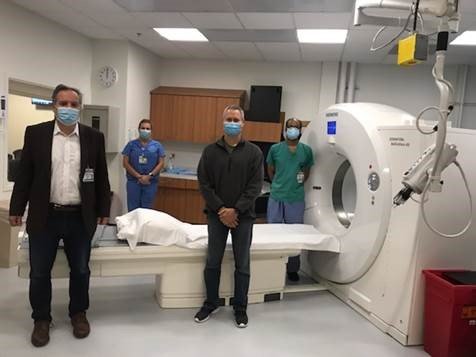
JERSEY CITY, NJ – Joseph Bilotta began experiencing shortness of breath in October last year when it was recommended he see a pulmonologist, who prescribed an inhaler.
The inhaler seemed to work fine until this summer, when his shortness of breath returned, but even more severely. That’s when the 55-year old Bayonne man who was in otherwise good health decided to see a cardiologist affiliated with Jersey City Medical Center.
Dr. Mitchell Baruchin, part of the RWJBarnabas Health medical group, ordered several cardiac tests that raised concerns. Baruchin scheduled Bilotta for a cardiac catheterization procedure the following week that would look inside the arteries of his heart to see if any were blocked.
But the Saturday before his scheduled procedure, Bilotta, barely able to breathe, took himself to the emergency room at JCMC. Bilotta was admitted to the hospital and on Monday morning he was in the catherization laboratory, where Dr. Vladimir Znamensky discovered significant blockages in three main arteries. The medical term is coronary artery disease caused by atherosclerosis, the buildup of plaque in the arteries.
Dr. Znamensky, who specializes in interventional cardiology, advised Bilotta he needed immediate open-heart surgery. Dr. Tyrone Krause, a cardiothoracic surgeon, chief of Cardiothoracic and chair of Surgery at Jersey City Medical Center, was recommended.
“I didn’t know anything about Dr. Krause or about how capable Jersey City Medical Center was in performing this kind of surgery,â€
Bilotta said. “I’m the type of guy who likes to do a lot of research before I hire a mechanic or a carpenter, and now I’m going to have someone open my chest and I really didn’t have time to do research on him..”
After speaking to Dr. Krause and learning more about his background, he felt at ease. “He’s highly proficient at performing this kind of surgery,†Billota said.
On Wednesday morning, July 15, Bilotta went into surgery.
Bilotta remembers coming through in the critical care unit. His bed was near the nurses’ station and he recalls overhearing the nurses’ conversations.
“The nurses in the critical care unit where just unbelievable,†Bilotta said. “The passion, the commitment and devotion that they have to their jobs. I was just so incredibly impressed. These nurses were truly called to do what they’re doing. You know, this is not just a job for them.â€
Recovering on the patient floor, Bilotta appreciated the excellent care from the nursing staff that continued throughout his stay.
“The care was just off the charts,†Bilotta said. “The nurses would take the time to explain what they were doing. If they were giving me medicine, they would explain what it does. They were really interested in making sure I was being educated on what was happening.â€
Bilotta was discharged on July 21 and has been getting better every day. His best friend has become a spirometer, a medical device that measures the amount of air you’re able to breathe in and out and the time it takes you to exhale completely after you take a deep breath.
Bilotta now walks three miles and day and just restarted his job as an engineer working from home at Ethicon, a Johnson & Johnson subsidiary that manufactures medical devices.
Bilotta remains perplexed at how he succumbed to coronary heart disease.
He considered himself healthy, exercised two to three times a week, maintained the same weight since high school, followed a healthy diet and did not have a family history of coronary artery disease.
“You don’t necessarily have to have the risk factors to be susceptible to this coronary artery disease,†Bilotta said. “I’m just glad my cardiologist discovered it in time to save my life.â€
If you have any of the signs or symptoms of coronary artery disease, including chest pain or shortness of breath, make an appointment with your cardiologist. To schedule a visit with one of Hudson County’s top cardiac specialists, visit rwjbh.org/hudsoncounty.
